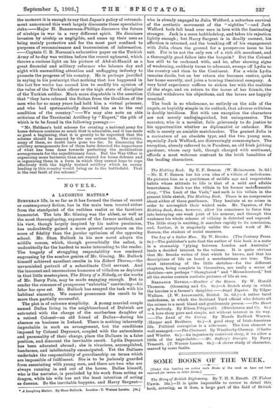NOVELS.
A LAUGHING MATTER.*
SUBURBAN life, in so far as it has formed the theme of recent or contemporary fiction, has in the main been treated either from the standpoint of the ruthless realist or the facetious humonrist. The late Mr. Gissing was the ablest, as well as the most thoroughgoing, exponent of the former method, and his view, though largely inspired by his native pessimism, has undoubtedly gained a more general acceptance on the score of fidelity than the jocular optimism of the opposing school. Mr. Shan Bullock in his new novel adopts the middle course, which, though proverbially the safest, is undoubtedly far the hardest to make interesting to the reader. The tragedy of struggling respectability was rendered engrossing by the sombre genius of Mr. Gissing. Mr. Bullock himself achieved excellent results in his Robert Thorne,—the unvarnished portrait of a subordinate Civil servant. And the innocent and unconscious humours of villadom as depicted in that little masterpiece, The Diary of a Nobody, or the works of Mr. Barry Pain, may be made engaging enough. But to render the romance of prosperous "suburbia" convincing—hic labor hoc opus est. Mr. Bullock has essayed the task with his habitual sincerity. We cannot pronounce the result to be more than partially successful.
The plot is of extreme simplicity. A young married couple named Dallas living in the neighbourhood of Dulwich are entrusted with the charge of the motherless daughter of a retired Colonel—an old friend of Dallas—during his absence on business in Ireland. There is nothing inherently improbable in such an arrangement, but the conditions imposed by Colonel Deycourt, coupled with the antecedents and personality of their charge, place the Dallases in a false position, and discount the inevitable result. Lydia Deycourt has been educated abroad ; she is vivacious, accomplished, handsome, and intellectually emancipated. Yet the Dallases undertake the responsibility of guardianship on terms which are impossible of fulfilment. She is to be jealously guarded from associating with young men, and there are two who are always running in and out of the house. Dallas himself, who is the narrator, is precluded by his work from acting as dragon, while his wife has not the least intention of acting as duenna. So the inevitable happens, and Harry Sargent- • A Laughing Matter. By Shan Bullock. London : T. Werner Laurie. Os.] who is already engaged to Julia Welford, a suburban survival of the aesthetic movement of the " eighties "—and Jack Welford both fall head over ears in love with the fascinating stranger. Jack is a mere hobbledehoy, and takes his rejection lightly enough ; but Harry Sargent is in deadly earnest,. his affection is returned, and the breaking off of his engagement with Julia clears the ground for a prosperous issue to his suit. For is be not the only ROO of a rich silk merchant, and a thoroughly good fellow into the bargain ? But the Colonel has still to be reckoned with, and he, after showing aigne of weakening, suddenly turns to adamant, sweeps off Lydia to the country and then to the Continent. For a while Lydia remains docile, but on her return she becomes restive, quite her home secretly, and joins a touring theatrical company. A very brief experience suffices to sicken her with the realities of the stage, and on return to the house of her friends, the Colonel withdraws his objections, and the lovers are happily reunited.
The book is so wholesome, so entirely on the aide of the angels, so boyishly simple in its outlook, that adverse criticism is doubly invidious. But with one exception the characters are not merely undistinguished, but unimpressive. The narrator, who is a novelist, fails grievously to do justice to his opportunities whether as diplomatist or onlooker. His wife is merely an amiable matchmaker. The genteel Julia is a caricature of an obsolete type, and the two young men, especially Jack Welford, are distressingly commonplace. The exception, already referred to, is Paudeen, an old Irish jobbing gardener, whose racy talk, though charged with sentiment, affords a most welcome contrast to the brisk banalities of the leading characters.






































 Previous page
Previous page